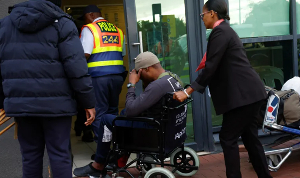'It's time we push more northerners into the school system as that is the only way they can develop and think for themselves. These good for nothing Animals don't want to go to school.' - Kofi Boateng,(Patapaa) NY
"We the southners are tired of your incessant complains. You guys had free education from Nkrumah's era which was called "subvention" while those of us from the south even though our parents were poor yet we did pay school fees." - Yaw Opoku, USA
The quotes you have just read are not the product of my imagination nor did I conjure them out of thin air; these are the sentiments of two dunces and give a glimpse into the fiery invective that greeted Dr. Ahmed Kuyini’s March 15, 2009 article on Ghanaweb in which he effectively deconstructed Nana Kofi Amankwah’s ridiculous analysis of the northern development conundrum. Besides their patent absurdity, the quotes provides an opportunity to pry into the mind set of some Ghanaians who can't seem to wrap their minds around the fact that the current NDC administration and successive administrations will continue to enact prudent public policies to rectify glaring national inequities between the north and the south inherited at independence. While Dr. Kuyini was overly civil in his rebuttal, a considerable chunk of the responses his piece generated were half-witted, dripped with sarcasm and condescension, and for most part, depicted a stunning reluctance to understand that the north's continuous pernicious state is a stain on the national conscience.
My goal here is not to regurgitate what Kuyini so eloquently illuminated, but to understand the palpable southern anger that deluges any discussion of development in the northern regions. Why do southerners react with such venom? What indeed lies beneath the din? Is the anger a subtle display of southern tribalism or an expression of frustration at the apparent inability of "warring factions" in the north to reach a truce and thus end a "war" that continues to sponge off scant national resources?
I don't have answers to these questions, but one thing need to be said loud and clear; the railing and the grotesque name-calling by some of our southern compatriots are grossly misplaced and ought to stop. There is nothing more irritating than the smugness, arrogance and condescension that always accompany the southern yowl. Each time the north convulses in spurts of violence or the issue of its long over due development is broached, vapid southern polemicists slither out of their holes to pontificate.
Consumed by their own self worth these southern critics believe, however erroneously, that they have the prescriptions to all that ails the north. Not unexpected, they display a propensity to fixate on and demonize the region through a one dimensional lens. "Blame the natives" has become their mantra. These warped views about the north projected relentlessly on Ghanaweb are influenced and shaped by crass ignorance, a complete distortion of historical and economic realities and complemented by a blatant refusal to acknowledge that as a group, northerners suffer disproportionately from disparities in wealth, education, income and employment.
It is easy to see why some of our southern brethren still cling to these outlandish views contrary to volumes of empirical evidence that point to a national economic system skewered in favor of the south. For one thing, they have never ventured into the northern regions to learn, first hand, how the dearth of sustained development continues to haunt the region and inhibit the economic mobility of its residents.
And for another, they see the north as a far-flung, desolate swath of arid land, years removed from progress, trapped in a time warp and consumed by the raging flames of ethnic conflagration. Truth be told, if these southern critics had their way, they would clamor for a “decoupling†between the north and the rest of the country, a clean break by the south from those troublesome and aggressive northerners; northerners should sprout wings and fly away, somewhere.
The critics are wrong on many fronts; the north isn't a vast expanse of scrubby dry land, nor a region far removed from civilization and its trappings.
On the contrary, the region is thriving, thanks in large part to the efforts of its sons and daughters resident at home and abroad. The rapid growth of its major urban areas, Tamale, Bolga, and Wa point to their desire to tackle the modernization of these towns much on their own.
A majority of residents in these areas deeply resent the violence that has unjustifiably come to define them as a people. Not surprisingly, each outbreak of violence is roundly condemned. Many "non-combatants" of different political and tribal stripes are fatigued by the appalling bloodletting and crave a permanent end to the perennial hostilities.
Need I remind the southern critics that the north is an integral part of Ghana and has been for decades; stereotyping the region and its people won't deter them from seeking remedies to decades of benign neglect. Moses K.Yahaya, a freelance journalist, lives in Jersey City, New Jersey.
Opinions of Sunday, 22 March 2009
Columnist: Yahaya, Moses Kofi
Southerners view the North through a one dimensional lens; violence
Entertainment













